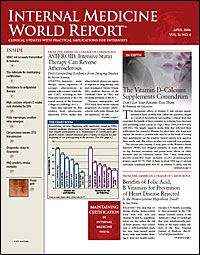Exogenous Testosterone Safe, Effective in Postmenopausal Women If Properly Used
Exogenous Testosterone Safe, Effective in Postmenopausal Women If Properly Used
the role of androgen or dehydroepiandrosterone (DHEA) in women’s sexual function and the
issue of testosterone supplementation for older women have been hotly debated in
the medical literature in the past few years, raising questions about the safety and efficacy
of prescribing testosterone-containing pharmaceutical agents to menopausal and postmenopausal women, as more and more women have been turning to their physicians for help. The recent position statement issued by the North American Menopause Society
(NAMS) on the role of testosterone therapy in postmenopausal women (Menopause.
2005;12:497-511) helps resolve some of these issues. The NAMS statement says
that although endogenous testosterone has not as yet been linked with sexual function
in women, the evidence clearly shows that exogenous testosterone improves sexual desire and responsiveness, as well as the frequency of sexual activity, in postmenopausal
women. A variety of conditions can lower serum testosterone levels in women who have
entered menopause spontaneously or surgically induced (Table). The statement is based primarily on data from randomized, controlled clinical trials. The most recent and largest study
of exogenous testosterone included 533 women with surgically induced menopause and low sexual desire (Obstet Gynecol. 2005;105:944-952). Compared with placebo, a 300-mg/day testosterone patch significantly improved satisfaction of sexual activity at 24 weeks (mean change from baseline, 1.56 events per 4 weeks vs 0.73; P =.001) and sexual desire (mean change, 10.57 vs 4.29; P <.001), and reduced personal distress (P = .009). NAMS concluded that the actual risk of associated hair growth and acne assumed to be associated with the use of testosterone in women is unknown, and that the beneficial effects of exogenous testosterone
on other conditions (eg, bone mineral density, menopausal symptoms, lipids, breast
cancer) have not been proven. NAMS’ position statement includes the following recommendations: • Postmenopausal women with decreased sexual desire that causes personal distress may be candidates for testosterone therapy, if no other cause of the problem can
be found. • Do not use testosterone therapy without concomitant estrogen therapy, since no
data have shown that exogenous testosterone is effective or safe in women who
are not taking estrogen. • Laboratory testing of testosterone levels is only indicated to monitor supraphysiologic levels before and during therapy, not to diagnose testosterone insufficiency.
• Since testosterone values differ among laboratories, use reference ranges provided by
the testing laboratory to assess results. • The free testosterone index is the easiest
and most readily available measure of free testosterone. • If the testing laboratory cannot provide
the calculation, the more complex but more accurate Sodergard equation for free testosterone may be used. • Salivary testing is an unreliable measure of testosterone levels. • Consider testing serum lipid and liver function profiles at baseline and at 3 months before beginning testosterone
therapy. If levels are stable, annual testing is recommended. • Use the lowest dose of testosterone therapy for the shortest time to meet treatment goals. • Only oral testosterone products have been FDA-approved for women (use for sexual dysfunction is off-label), but transdermal patches and topical gels or creams may be preferred to avoid the first-pass hepatic
effects associated with oral formulations. • Excessive dosing is a concern with pellet and intramuscular formulations. • Do not use testosterone products formulated for men unless the doses are reduced considerably and serum levels are monitored closely. • Use custom-compounded products with caution since the dosing may be inconsistent compared with FDA-approved products. • The efficacy and safety of >6 months of testosterone therapy is unknown. • During therapy, ask the patient about changes in sexual response, desire, and satisfaction, and about potential side effects.• Reduce the dose of exogenous testosterone if adverse events occur; if side effects do not abate, discontinue therapy. • Do not use testosterone therapy in a woman who cannot take estrogen therapy or in postmenopausal women with breast or uterine cancer or with cardiovascular or liver disease. • Before starting therapy, counsel the
patient on the potential risks and benefits and limitations of any non—FDA-approved
therapies. Because nonproprietary DHEA-based products have been sprouting on the market,
raising concerns about their safety and efficacy, having clear guidelines on when to
use FDA-approved products, even if offlabel, can help physicians better manage a
patient with symptoms of sexual dysfunction and minimize the risk of that patient
turning to untested products.
